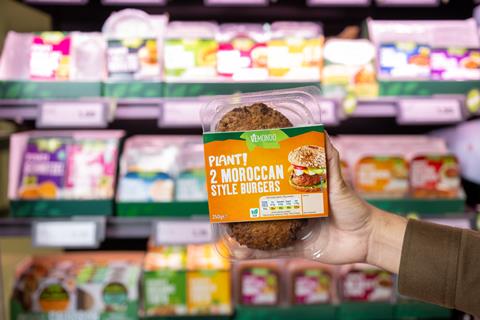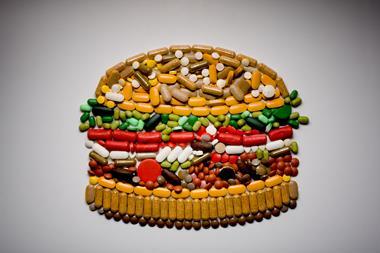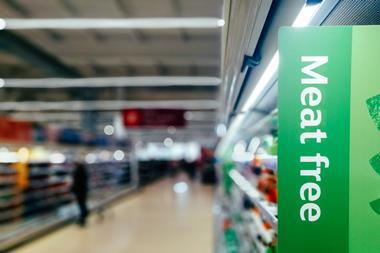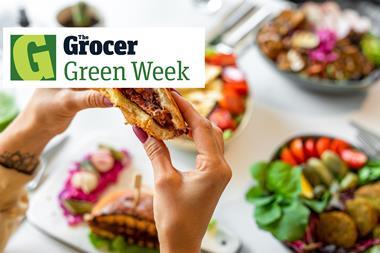
Lidl has called for mandatory healthy food sales reporting to include plant-based targets.
Amali Bunter, Lidl GB head of sourcing and ethical trade, said the supermarket wanted the government to “level the playing field” by making other retailers follow its example of setting a plant-based protein sales target.
“We have a protein-split target,” said Bunter. “Our goal is by 2030 to have 25% of the protein going through our tills by tonnage coming from plant-based sources versus animal-based protein.
“We’re currently at 18%, up from 14% when we set the target [in 2021].
“Absolutely, we want that to be something that the market is doing. And absolutely we feel that is a role that government can play in terms of policy to level that playing field.”
Bunter was speaking at a panel discussion hosted by Lidl on Wednesday to mark the publication of its latest annual sustainability report.
Her call was echoed by panel guest Anna Taylor, executive director of the Food Foundation, who said: “I think at the very least we should be asking that included within the mandatory reporting requirements, which the government is considering now, [there should be] reporting on the protein split. I think that would level the playing field.”
The government announced in June that it would mandate reporting on healthy food sales for all large food businesses and in time set targets for improvement under its 10-year health plan.
Lidl is advocating the inclusion of plant-based protein targets to tackle climate change as well as improve health. The discounter has aligned with Eat-Lancet Planetary Health Diet ambitions of cutting consumption of carbon-intensive foods such as red meat by 50% globally by 2050, while doubling consumption of fruit & veg, nuts and legumes.
Taylor said: “We’ve got an opportunity to really think about this disclosure piece. We don’t want to overcomplicate it. I think there are probably three or four metrics which tell us about the whole diet and not just one aspect of it.
“And I think the concern is if we only focus on the healthiness of food sales, we miss some really crucial details.”
Bunter added the caveat that businesses were facing “a lot of reporting burden”. “We’ve just had the fun and games of EUDR [EU Deforestation Regulation]. Is it on, is it off? There’s EPR.
“There’s a lot going on and I really want to make sure that companies are focused on where they can have an impact. But I think if we can do it in the right way while we’re leveraging common data sets, then it levels the playing field and it helps us to have the right conversations about progress.”
Read more:
-
Can mandatory health reporting succeed with ‘two-tier approach’?
-
Lidl calls on other supermarkets to do more to signpost healthy and sustainable choices
-
Health targets will cost supermarkets ‘tens of millions’ Streeting warned
-
Wes Streeting says supermarkets will be ‘set free’ to decide how to meet new healthy food standard
-
10-year health plan: the big questions for the food industry
-
How will healthy sales targets and fines be applied?
Taylor also criticised businesses for lobbying against HFSS advertising restrictions, leading to watered-down legislation that would still allow brands to advertise.
“We’ve seen a huge range of business behaviour in this space, some helpful, some incredibly unhelpful,” Taylor said.
“On the helpful end there are a number of businesses that came out and said, ‘We really are committed to disclosing the healthiness of our food sales and we think the government should make this mandatory for all food businesses.’
“On the other side, when the government is trying to introduce restrictions around advertising, we’ve seen pretty heavy lobbying from the food industry to weaken that legislation, so that now we’re going to have some regulation which will not really restrict brand advertising.
“Companies are just going to pivot from product advertising to brand advertising as a way of getting round the restrictions, so there is not necessarily any net gain.”
‘Healthy and healthier’ products make up 80% of Lidl GB’s sales by tonnage, according to its sustainability report.
The supermarket has grown sales of own-label meat-free products and alternative plant-based milk by 700% since 2020, exceeding a target of 400%.
It has also cut Scope 1 and 2 emissions by 11.4% since 2019, with operations now powered by 100% renewable electricity, according to its report.
Lidl GB chief commercial officer Richard Bourns said: “Aligning our strategy with the Planetary Health Diet is a long-term commitment to building a healthier, more sustainable food system. It’s delivering measurable impact – beyond the basket – by making healthy and sustainable food more accessible and affordable.
“The progress outlined in our report shows we’re matching growth with real sustainability progress. From sourcing materials responsibly and reducing emissions, to investing in British farming, we’re proving sustainability and value go hand-in-hand.
“Our customers expect us to lead with purpose, and we’re proud to be doing just that. By embedding sustainability into the heart of our operations, we’re not only protecting the planet – we’re supporting communities, empowering suppliers, and delivering the quality and value our customers rely on every day.”



















No comments yet